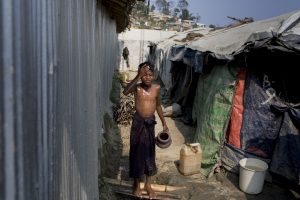Indonesia has called on the government of Myanmar to create safe conditions for the return of hundreds of thousands of Muslim Rohingya refugees currently living in Bangladesh. The country’s Foreign Minister Retno Marsudi issued the call at a news conference on January 21, after an online meeting of foreign ministers from the 10 nations of the Association of Southeast Asian Nations (ASEAN).
“Indonesia earnestly hopes that the Myanmar government can immediately create favorable conditions in Rakhine State so that repatriation can be done voluntarily, safely, and in a dignified manner as soon as possible,” Retno said.
Most of the 1 million Rohingya currently in Bangladesh fled the country in August 2017, when the Myanmar army, or Tatmadaw, launched a brutal “clearance operation” in Rakhine State in the west of the country. Justified as a response to attacks by Rohingya militants, the offensive saw soldiers and vigilantes torch villages, shoot civilians, and drive an estimated 750,000 desperate people over the border into Bangladesh.
Since 2018, ASEAN has sought to resolve the humanitarian crisis by planning for the eventual repatriation of the refugees to Rakhine State. The comment from the Indonesian foreign minister followed a meeting between Bangladesh and Myanmar, brokered by China, when the two nations reached a tentative agreement to begin repatriation in the second quarter of this year.
During their virtual meeting, which was hosted by incoming ASEAN chair Brunei, Southeast Asian foreign ministers applauded the agreement between Dhaka and Naypyidaw, and reaffirmed their support for the repatriation plan. “We welcomed the Government of Myanmar’s continued efforts in addressing the situation in the Rakhine State, including commencing the repatriation process in accordance with its bilateral agreements with Bangladesh,” the ministers said in a joint statement.
The comments indicate ASEAN’s – Bangladesh’s – desire to prevent the Rohingya refugee camps becoming a permanent fixture. But repatriation continues to face formidable obstacles. Two earlier attempts to begin the voluntary return of Rohingya refugees to Myanmar have already failed, mostly because the conditions inside Rakhine State were not safe or secure enough for people to return.
This seems unlikely to happen for the foreseeable future. To be sure, the fragile ceasefire between the Myanmar military and the insurgent Arakan Army, which has seen fierce fighting across Rakhine State since 2018, has removed an important obstacle to refugees’ return. But the situation otherwise remains inhospitable. The rights group Human Rights Watch has accused Myanmar’s government of running an “apartheid” regime for Rohingya Muslims and other minorities in Rakhine State, where some 130,000 displaced Rohingya civilians remain confined in “squalid and abusive” facilities that it likens to “open-air detention facilities.”
Meanwhile, the Rohingya continue to face the hostility of a significant number of Buddhist Rakhine nationalists, to say nothing of the general lack of sympathy for the Rohingya among Myanmar’s population as a whole, many of whom view them (as the government does) as illegal immigrants from Bangladesh.
For this reason, repatriation is more than a simple matter of housing and logistics, the sorts of challenges that ASEAN identified in its 2019 Preliminary Needs Assessment. It depends fundamentally on the political conditions within Rakhine State itself. Whether the Myanmar government “can immediately create favorable conditions” in Rakhine – or whether it even wants to, given its reluctance to recognize Rohingya Muslims as citizens, or even to employ the word “Rohingya” – remains very much in doubt.
“ASEAN keeps responding time and again with the same rhetoric and approach. Now it is pushing the return of the Rohingya refugees to a place that is completely unsafe,” Charles Santiago, the chair of the rights group ASEAN Parliamentarians for Human Rights, said in a statement ahead of the meeting of ASEAN foreign ministers this week. “It’s time to take stock of what little progress ASEAN has achieved so far in resolving this crisis, and of Myanmar’s clear disregard for its calls.”
Given the political constraints, particularly the lack of political will on the part of the Myanmar government, it is hard to see what a more substantial or workable solution to the Rohingya crisis might look like. As I noted in an article yesterday, most attempts to resolve the Rohingya crisis have nibbled around the edges of the political realities that produced the crisis in the first place. All this suggests that a final resolution remains a long way off.

































